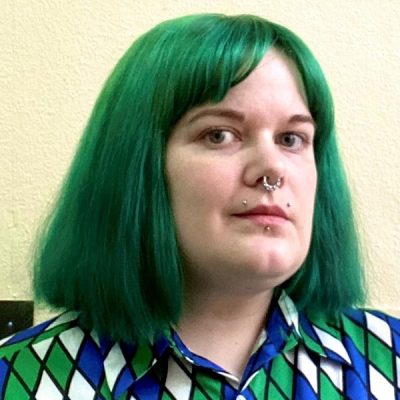Leah Amber McBride

Art Historian, Admissions Officer at the University of Glasgow, Scotland
Education:
Bachelor of Arts in Art History, UNC Charlotte (2012)
MLitt in History of Art, University of Glasgow, Scotland (2014)
PhD in History of Art, University of Glasgow, Scotland (2019)
Hometown: Monroe, N.C.
“As a first-generation university student, I had no real understanding of what college life would be like when I first enrolled at UNC Charlotte,” says Leah McBride. “What I found in the College of Arts + Architecture was a vibrant community of students of all ages and from varied backgrounds that created an atmosphere of collaboration and support. The staff were all passionate about their areas of expertise, and this was reflected in their teaching methods.”
After completing her Bachelor of Arts in Art History, Leah began a master’s program at the University of Glasgow, Scotland, with a focus on radical politics in 20th-century avant-garde art. During this time, she says, her research interests began to shift as she fell in love with the vibrant contemporary arts culture across Scotland. Completing her master’s, she began her Ph.D. studies at the University of Glasgow in 2014 with an emphasis on transgressive representations of collective traumas in contemporary art.
“I was interested in the ways in which contemporary artists attempt to address the cultural traumas inflicted by genocide, war, and terrorism from within specific cultural contexts rather than a universal conception of trauma as it is understood in the Global North,” she says.
Though nurtured in her graduate program, the seed of that interest was actually planted during her undergraduate studies in Charlotte.
“In 2009, for International Education Week, contemporary artist Alfredo Jaar was invited by UNC Charlotte to give a lecture on his photographic installations and public interventions borne out of his experiences documenting the Rwandan Genocide. Jaar also hosted a roundtable discussion with students from the Department of Art & Art History, where we discussed the power of the artist to engage with the political both within the gallery and in the public sphere. This event was a pivotal moment for me, cementing my research interests in contemporary art that deals with collective traumas.”
Leah earned her Ph.D. in 2019, the first UNC Charlotte art history student to earn a doctorate. One of her dissertation chapters is devoted to Jaar.
“Perhaps the most important thing I learned from studying art history was how to be a scholar—how to think critically, research carefully, and engage with the wider arts community through public engagement and publication. This would not have been possible without the support of the lecturers in the art history program, who recognized my passion and fostered it throughout my studies. The skills they helped me develop prepared me for the rigors of graduate study, and their example helped me develop my own teaching practice, through which I hope I have been able to pass on that passion for the arts to the next generation of students.”
From 2015 to 2021, Leah taught art history courses at the University of Glasgow in both the Art History and Lifelong Learning departments, in subjects ranging from the Florentine Renaissance to the History of Psychogeography. She is currently working on a publication in collaboration with the Hunterian Art Gallery on Scottish modernist John Bellany’s painting and prints and an essay in an edited collection on the use of blood as an artistic medium in contemporary art. In 2021, she took on a position as an Admissions Officer at the University of Glasgow, where she focuses on postgraduate admissions in the College of Sciences and Engineering.
To current students in the Department of Art & Art History at UNC Charlotte, she offers the following advice:
“For fine arts students developing their practice, I would advise studying as much of the history of art that you can. Do not be afraid of becoming too influenced by something that came before you. The history of Western Art is a conversation, often with or against other cultural histories, and you should enter it as a practitioner with as much knowledge as possible. For art history students, I would advise paying particular attention to the kinds of art you do not like. Study it carefully and find ways to articulate why it does not interest you. This will help you develop skills in critical engagement that will help you more effectively discuss the art you do appreciate, which is much more difficult.”
Leah received the 2022 Distinguished Alumni Award for the Department of Art & Art History.